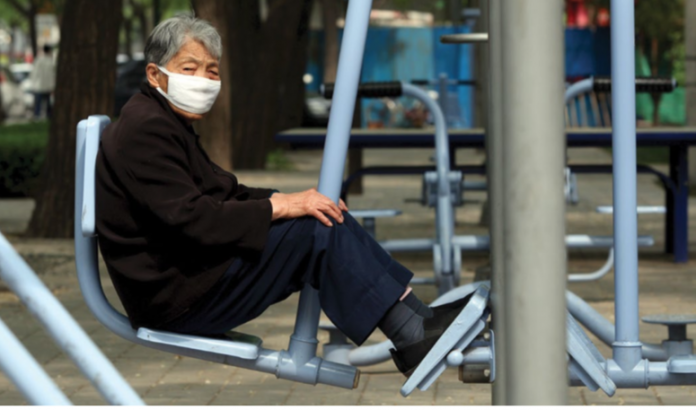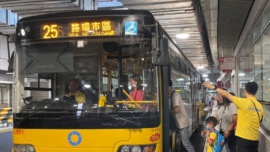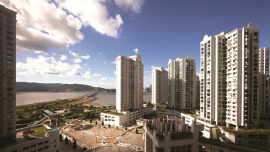Macau Business | December 2021 | Special Report | Macau’s ageing society
Loneliness takes a heavy toll on senior citizens’ health
In 2004 the Social Welfare Bureau (IAS, the acronym in Portuguese) commissioned research from the Kiang Wu Nursing Institute of Macau into the health of the local elderly, resulting in the paperResearch Report – The Long-Term Care Needs of the Elderly in Macao.
The report revealed that while “the overall health situation of elderly people in Macau is relatively good,” 84.5 per cent of elderly people suffer from one or more illnesses.
Among the elderly respondents, 46.6 per cent suffered from hypertension, 35.9 per cent from cataracts and other eye disorders, 20.7 per cent from degenerative joint disease, 19.4 per cent from heart disease and 18.4 per cent from diabetes. “The elderly lack recreational activities of an intellectual nature,” the report stated. In another finding, “the elderly interviewed stated that the help they most needed was economic support, social housing and domestic cleaning services,” with free medical assistance listed only after those concerns.
Professor Leong Sok Man, Kiang Wu Nursing College, revealed that “more than 80 per cent of older adults suffered from one or more chronic diseases in Macau.
“My previous research found that older adults had a low awareness of health responsibility (the ability to maintain their health), and they mainly receive medical services passively. One reason is that the current education level of older adults is generally low; they do not have the confidence to discuss their health problems with healthcare professionals. Another reason is due to short consultation times: healthcare professionals failed to train older adults to self-manage their health conditions. Furthermore, most older adults rely on the Macau Government’s free medical care system; the interval between two follow-up visits is long.”
The researcher from Kiang Wu cites yet another problem: “Some patients often stop taking medication by themselves or do not take the medication as it is prescribed by their doctors, resulting in a waste of medication and unfavourable disease control. Therefore, it is necessary to optimize the follow-up consultation system and strengthen older adults’ ability to self-manage their health conditions.”
Based on the data in this Report, in April 2016 the Macau Government officially announced and implemented the “Macau Special Administrative Region Pension Insurance Mechanism” and the “Ten Year Action Plan for Elderly Services 2016–2025”.
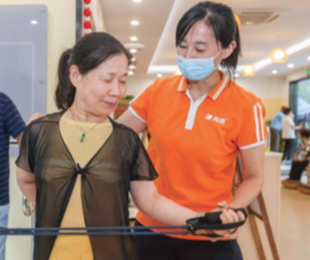
A total of 57 measures in the field of social services are being rolled out, including policies on disease and publicity, treatment, rehabilitation and long-term care, “which have been gradually implemented,” Andrew Ng tells Macau Business. According to the Senior Lecturer, Department of Social Work, Faculty of Social Sciences and Education, University of Saint Joseph, “Compared with other countries and regions, Macau has invested a lot of resources into medical welfare for the elderly.”
But this is an area where there is always more to be done – not least because predictions indicate conditions will worsen as a result of the increased percentage of elderly people at the top of the population pyramid.
For this reason, Andrew Ng suggests that “when the SAR government’s gaming tax revenue is stable and financial reserves are sufficient, medical expenses can be met.”
According to the social work expert, “It is recommended to consider introducing a trust system for elderly medical insurance and other related medical care, to protect the elderly in the future. The stability of various medical benefits is also due to the healthy competition of medical institutions, which will gradually improve the medical standards in Macau and provide the elderly with medical and health protection in the next 20 years.”
However, according to lawmaker Si Ka Lon there is a perception in local public opinion that “the constant increase in health expenditure can become a great white elephant. Citizens do not experience significant improvements in access to health care, as the waiting time remains long in the case of particularly serious or urgent illnesses and the effects of treatment are not satisfactory, leading some citizens to leave Macau and seek medical treatment elsewhere, bearing substantial expenses.”
Andrew Ng, who is also vice-president of the Macau Social Workers Association, is especially concerned with the issue of preventing falls for the elderly in Macau.
He quotes the results of a survey conducted in the Social Welfare Bureau’s Evaluation of the Needs for Long-term Care Services for the Elderly in Macau, which shows that 7.2 per cent of the respondents had had household accidents within the last three months and that the most common accident is a fall (50 per cent). “It can be seen that the proportion of accidental falls among the elderly at home is high, and the elderly tend to deal with accidents on their own.”
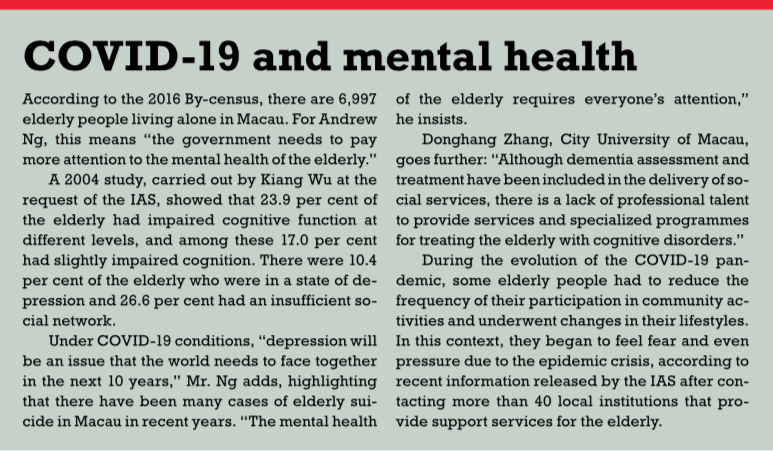
Mr Ng recognizes the recent efforts of the SAR government in introducing many smart technologies in the design of elderly apartments, among them fall detection. Nevertheless, he warns, “although technology can help us take better care of the elderly, many elderly people are not aware of high-tech products or have limited ability to use them and even feel wary or fearful around these products,” adding, “at the same time, technology is cold and cannot replace people, especially the emotional communication between people.”
Professor Leung Kai Yin, Macau Polytechnic Institute, agrees with the importance of the human touch: “Civil society can bear responsibility for primary health care service. This service includes not only medical service, but also organization of mutual help groups for people suffering from long-term illness. This civil responsibility would reduce the government’s financial expenditure on medical services. On the other hand, civil society can also promote mass sport programmes and warn against habits such as drinking and smoking to encourage people to keep in good health. With that foundation, even when people become elderly, they can remain in good physical condition and need to see a doctor less frequently.”
In conclusion, Professor Leong of Kiang Wu Nursing College shares her own research, which confirms that “specialized nurse outpatient clinics for some chronic diseases (such as hypertension, coronary heart disease, diabetes, etc.) have proved to have a significant effect on helping older patients improve their self-care ability, which should be the development trend across the Macau healthcare service.”
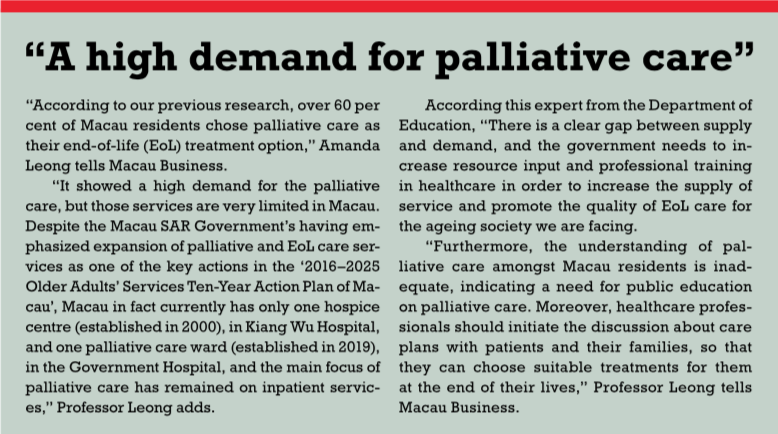
Special Report | Macau’s ageing society – Previous – Living the last days in a studio





